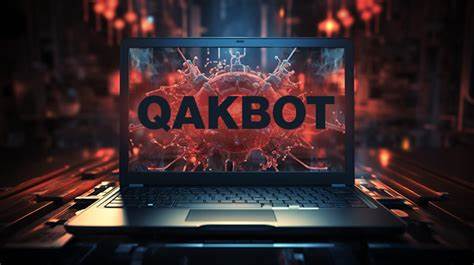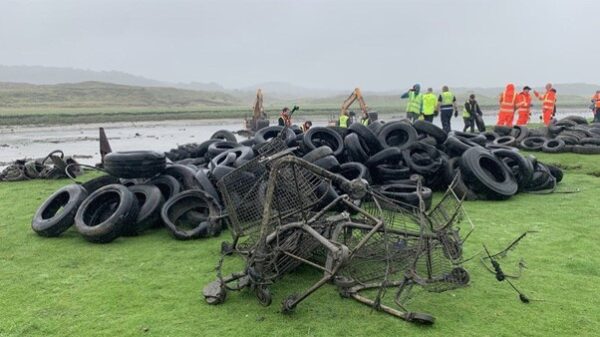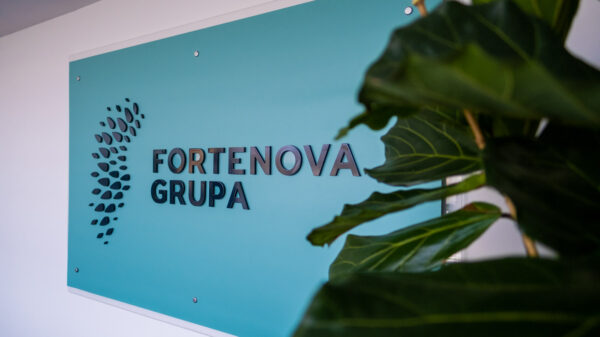By Andrew Harding, Paris correspondent
Earlier this week, two earnest teenagers walked down a narrow, cobbled lane in the ludicrously pretty medieval market town of Auray.
As they handed out leaflets for their party, the far-right National Rally, you could hear the angry mutterings – the soundtrack of France’s unexpected and acutely polarising parliamentary election campaign – spluttering to life in their wake.
“Go to Moscow,” declared a man sitting in the shade beside the town’s church.
“Fascists. It’s horrible. We just hate them,” said Solène Jambou, 50, watching the two young men pass in front of her clothes stall.
But many other people in the market came over to collect leaflets from the young campaigners.
“Things have to change in France. We’ve tried everything else, so why not this? We have to keep our cultural identity. At some point we have to put our house in order,” said a retired fireman, who would only give us his first name, Armand.
“We were moderate and open, and now we can’t take it anymore. It’s the insecurity caused by uncontrolled immigration… they refuse to adopt our customs,” said Gwenaëlle, 56, as she stood in a queue.
It is a sign of quite how polarised French politics has become, not least in the weeks since President Emmanuel Macron shocked the nation by announcing fresh elections, that Brittany – long regarded as one of the most moderate corners of France – has seen a rush of support for the National Rally.
It’s also a sign of the success with which the RN, as it’s known here, has changed its image from its overtly antisemitic, racist, pro-Kremlin, anti-European roots, to a party that at least a third of French voters now feel is part of the mainstream.
“The people calling us fascists are stuck in the past,” 19-year-old student activist Mathys Auger declared confidently, striding past a butcher’s shop.
Nearby a group of fellow National Rally campaigners huddled in a group, discussing their party’s call for greater powers for the police, more discipline in schools, and a strict clampdown on immigration.
“We’re not monsters,” said their local candidate, Florent de Kersauson, with an amiable grin.
“We need to take back control,” agreed a supporter from an allied party, Reconquête, branded “extreme right” by the French authorities.
The huge weekly market in Auray was crowded, overwhelmingly with white people, but the student, Mathys Auger, a keen supporter of the RN’s immigration policies, said that merely proved his point.
“Foreign people stay in their own communities and don’t like to assimilate too much with French people. They have their own markets. If you go on public transport, you’ll see a lot of people… who will only speak their own languages… who may despise you and make themselves feel comfortable in a country that is not theirs. I have the impression that I no longer have my rightful place as a Frenchman. Our identity is European and Western and should not be mixed with extreme religious ideas from the east,” said Auger.
Sipping coffee in a nearby café, the local MP, now fighting to retain his seat for President Emmanuel Macron’s centrist alliance, tried to sound upbeat, despite polls showing that voters are migrating away from the centre. But Jimmy Pahun hinted at the frustrations of many when he used the past tense, perhaps inadvertently, to talk about France’s increasingly unpopular President.
Meanwhile – in an election dominated, at least at the top level, by extremely young politicians – France’s new left-wing coalition, the New Popular Front, is being represented in Auray by a 20-year-old. She’s hoping to become the country’s youngest MP.
“I think my fear [of a far-right victory] is shared by a big share of the population. I think the RN are lying to us – they hide what they really are. There is a general psychosis about the immigration issue, which is certainly very important and needs to be dealt with, but not at all in the way the RN wants to deal with it,” said Jade Beniguel.
A short drive along the coast is the big port city of Lorient, with its harbour dominated by a vast concrete submarine base built by the Nazis during World War Two and now home to both the French navy and a handful of exotic racing yachts.
In the poorer outskirts of Lorient, amid tower blocks and well-tended communal gardens, the region’s immigrant communities are watching this weekend’s vote closely. The RN has seen a surge of support here too, but also a high abstention rate.
“My wife wears a veil. She’s a Muslim and is afraid because they want to ban the veil. Bardella [the RN candidate for Prime Minister] is promising a lot of things so people will vote for him. But frankly it’s scary,” said Saïd Romeo, a pensioner originally from Algeria, who was sat with a group outside a local shopping centre. He said he feared that an RN victory would trigger a surge of racist attacks across France.
“We feel it already. My wife has been insulted so often because of her veil. ‘Go home – this is not your country,’” said Romeo. But he blamed President Macron for the RN’s success, citing the rising cost of living and the price of supporting Ukraine against Russia’s invasion.
Nearby, a group of children were taking turns to practise their basketball skills in an indoor court. A local charitable organisation, funded by the state, plays an important role in supporting the community, coaching sports for children and offering a range of services, but its head, Maxime Godefroy, said he feared an RN-led government would slash support for this kind of work.
“[We] consider that RN project is contrary to our values, of human dignity, especially on migration issues. We never tell people who to vote for, but on this occasion, we took the liberty of saying that, from our point of view, the RN represents a danger [to our work],” said Godefroy.
Across southern Brittany, the rocky beaches are starting to fill up with tourists, and millions across the country are looking forward to watching the Olympic Games begin in Paris next month. But a deep sense of anxiety has also settled over this region, as people wait to see if these shock parliamentary elections will result in a political deadlock, an unprecedented victory for the far right, street protests and violence, a constitutional crisis, or perhaps some sort of combination of the above.











































